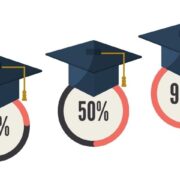Teens picking careers?! Preparing your teen for effective career exploration and college major selection
We see many sides of the career exploration process for teens. The yucky side is that some parts of this process cause stress for students – no one wants that. High school is a time of exploration (at least it should be), and those active steps can lead to more clarity and confidence at the end of high school. What steps are best? Many students don’t know how to begin the career exploration process.
Lots of teens start to make bold statements about their career plans. Many are just “posturing” (stating a career goal without any/much foundation), but this creates some friction for students without a career goal (or even the start of one).
We built the Guided Self Assessment process as a way to take actionable steps that start with what’s at the core of a student: their strengths and struggles, their interests, values, preferences, etc. That insight (gathered by their “guide”) can be the key to unlocking the next door – effective career exploration that’s tied to the individual’s strongest traits. (Note: we recommend Guided Self Assessment begin no sooner than the second semester of sophomore year in order to have collected enough experiences for discussion.)
“Wait – are you saying my 16-year-old should pick a career?” We agree that when you are 16, it’s very unlikely that you can know what you want to do for the rest of your life (for many reasons!). However, for students that want to take some first steps toward work they will love, Guided Self Assessment can be a perfect tool. Here are some reasons why…
College-bound kids need to have some sense of WHY they are going to college.
Just to go is not a good answer. “To grow up” is a valid answer, but one could argue “why pay $30k per year” to accomplish that. We want them to go for many reasons, but the thing they will do every day is go to class and learn the stuff that will equip them for their future career. They do have to pick a major and pass all the classes in it.
Does the student really need to have a major chosen before they head to college? Students can start college “undecided.” However, 60% of today’s college students take longer than 4 years to graduate. The risk of going beyond 4 years is real and being undecided needs to include careful planning and structure.
And then there is this…
For college-bound kids, having a sense of what you want to study can guide and inform your college list and visits.
In our backyard, The Ohio State University main campus has 160 undergraduate majors. Of course they’re not stellar at all of them! Different colleges have different strengths in the teaching of certain majors.
Families typically start college visits in earnest during junior year of high school. When you go on a college tour and you only take the general campus tour, you’ll simply hear what they want you to hear…the dog and pony show. All of the colleges will start to sound alike. And your kiddo may not know how to choose a school.
If you have a few potential majors in mind, your whole visit structure and purpose changes! Yes, do the dog and pony show — take the tour. BUT…contact the folks in the major program(s) ahead of time to schedule a visit. Sit in on a class. Talk to a professor. Really look around that facility that houses the major. That’s the real litmus test: can your student see themselves learning and growing there? Are they interested in learning this stuff?
Back to those all-important high school years.
They can and should be a time of exploration. Yes, there are classes students have to take, but there are a bunch they GET to choose! Our kids have so many options…and each little experience (whether an elective/class, a camp, workshop, job shadow, etc.) can be pivotal in helping them gain insight into what they want in life.
If they just sit in the seat in high school, taking the next class, doing the next paper, etc., it’s completely unrealistic to think they will lift their heads during junior year and “know” anything about a good-fit college major. But we really need them to because we are about to write some very large checks.
This all boils down to helping that kiddo start with what they know: who they are.
What’s important to them. When do they struggle and when do they soar. What lights them up. AND…how all of that information can lead to work they will (one day soon) love. Taking some tangible first steps (we’d ALWAYS suggest Guided Self Assessment!) can lead to that next baby step of effective career exploration. That leads to more honing in (“ooooh, I really liked this” or “wow, that seemed like a horrible job”), more exploration, more mini experiences, more confidence and clarity. And in the end, no matter what direction our kids choose, I know that we just want them to go with confidence and clarity.
Enjoy this post? Don’t want to miss any future blogs about education, college, or careers?











